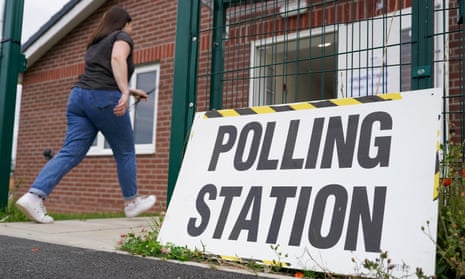Voters picking new MPs in three constituencies
Polls have opened in three parliamentary seats where byelections are being held, with Rishi Sunak braced for an electoral test of his premiership.
The Conservative-held constituencies are being targeted by Labour and the Liberal Democrats, who hope to overturn large majorities and send Tory MPs off into the summer recess nervous about their own political futures come the general election.
Voters have been able to cast their ballots from 7am in the south-western Tory stronghold of Somerton and Frome, Boris Johnson’s old seat in the west London suburbs Uxbridge and South Ruislip, as well as Selby and Ainsty in North Yorkshire.
Sunak was privately downcast on Wednesday afternoon about the his party’s electoral prospects, in part given the nature of why the contests were triggered.
Johnson stood down to avoid being suspended from parliament over a report that found he misled MPs over Partygate. Nigel Adams quit after being passed over for a peerage. And David Warbuton, an MP in Somerset since 2015, quit after being investigated over claims of harassment and drug use.
On top of the circumstances of the byelections being called, Sunak’s party is also polling poorly, nationally. At a behind-closed-doors meeting of Tory backbenchers on the eve of the byelections, MPs said Sunak appeared to acknowledge the results would be “tough”.
If the Conservatives are trounced, Sunak could become the first prime minister since Harold Wilson in 1968 to lose three byelections in a single day.
I will be looking after the politics blog today. If you have any tips or suggestions, please get in touch: [email protected].
Reminder: Please don’t tell us how you voted in the comments section – Election law (specifically section 66A of the Representation of the People Act 1983) makes it an offence to publish before the polls close at 10pm. Many thanks.
You can read more from my colleague Aubrey Allegretti here:
Key events

Peter Walker
Staff working for MPs need better HR access and a more supportive culture in parliament, but the system through which they are directly employed by members does not need to change, a report by a committee of MPs has concluded.
The Speaker’s conference on the employment conditions of members’ staff, chaired by Lindsay Hoyle, the Commons Speaker, was set up last year following a wave of stories about sexual harassment and bullying in parliament.
There was particular concern that staff working directly for MPs, as opposed to those centrally employed by parliament, were vulnerable given the HR practices and working culture were directly set by the MP, who was also their employer.
Ahead of the inquiry, Hoyle called for a change to this system, suggesting the idea of an outside employer, meaning staff would have independent input into their careers and concerns.
But the report, produced by a cross-party group of 16 MPs, led by Hoyle, said the problems faced by staff were “not inherently related to the identity of the employer”, and that changing the employer would be expensive, time consuming, and “ultimately a blunt instrument”.
They said:
We conclude that the nature of the work of an MP, and the close working arrangements and personal loyalty between members and their staff mean that members should continue to be the employers of their staff.
The report, which will be debated in the Commons before it is implemented, sets out other proposals, including universal access to professional HR, and reforms to the Independent Parliamentary Standards Authority, which has a significant role in the contracts and salaries of MPs’ staff.
More widely, the MPs said, there was a need for “a culture which recognises and values the work that [MPs’ staff] do and makes these staff feel part of the wider parliamentary community”.
Rishi Sunak braced MPs at a meeting of the 1922 Committee of Tory backbenchers on the eve of the polls on Wednesday night that they face a “tough battle” in what were seen as safe seats for his party.
The prime minister told them that governing parties rarely win by-elections but urged the MPs to unite in the face of any defeat as he pledged to “throw everything” at winning the next general election, PA News reports.
Labour hopes to snatch Uxbridge and South Ruislip, which was Boris Johnson’s seat until he quit, and Selby and Ainsty – vacated by his ally Nigel Adams’ resignation.
The Liberal Democrats are eying victory in the contest in Somerton and Frome that was triggered by David Warburton quitting after admitting cocaine use amid allegations of sexual harassment.
Losses for the Tories in all of them would be the first time in 55 years that a government has been defeated in three by-elections on the same day.
On Wednesday evening, Sunak was understood to have told his MPs:
In the coming months, I am going to set out more of what I would do if I had a full term.
I was recently described as a full spectrum modern Conservative and you are going to see that in the programme I lay out.
Sunak pledged to show the public “who is really on their side”, adding: “And that is what will propel us to victory.”
He was conscious of the battle he will face if voters roundly reject the Tory candidates, but urged MPs to unite ahead of a general election expected next year.
Sunak told the meeting.
When we come back in September we have a choice to make, all of us. Do we come together and throw everything at winning the next election or not? I’ve made my choice, I’m all in with you to win.
I promise you we can do this but we can only do it together as one team.
Tory backbencher Jonathan Gullis told reporters outside the meeting that the problem is “apathetic Conservative voters” rather than the public’s support for Labour leader Sir Keir Starmer.
He said Sunak told them “what we already know, which is it’s going to be a tough battle” in the by-elections.
Tory MPs at the meeting said he did not address suggestions that he could spring a Cabinet reshuffle on Friday in an attempt to reset his premiership.
During a visit to Warwickshire, Sunak told reporters asking whether he would shake up his top team that “you would never expect me to comment on things like that” – in what was clearly not a denial.
He welcomed a fall in the rate of inflation as proof his government’s plans were working.
The prime minister’s press secretary acknowledged it would be tough for the Tories to hold the three seats on Thursday.
She said:
By-elections, for incumbent governments, are very difficult, that is the nature of them.
The election that the Conservative Party is most focused on is the general election.
Voters picking new MPs in three constituencies
Polls have opened in three parliamentary seats where byelections are being held, with Rishi Sunak braced for an electoral test of his premiership.
The Conservative-held constituencies are being targeted by Labour and the Liberal Democrats, who hope to overturn large majorities and send Tory MPs off into the summer recess nervous about their own political futures come the general election.
Voters have been able to cast their ballots from 7am in the south-western Tory stronghold of Somerton and Frome, Boris Johnson’s old seat in the west London suburbs Uxbridge and South Ruislip, as well as Selby and Ainsty in North Yorkshire.
Sunak was privately downcast on Wednesday afternoon about the his party’s electoral prospects, in part given the nature of why the contests were triggered.
Johnson stood down to avoid being suspended from parliament over a report that found he misled MPs over Partygate. Nigel Adams quit after being passed over for a peerage. And David Warbuton, an MP in Somerset since 2015, quit after being investigated over claims of harassment and drug use.
On top of the circumstances of the byelections being called, Sunak’s party is also polling poorly, nationally. At a behind-closed-doors meeting of Tory backbenchers on the eve of the byelections, MPs said Sunak appeared to acknowledge the results would be “tough”.
If the Conservatives are trounced, Sunak could become the first prime minister since Harold Wilson in 1968 to lose three byelections in a single day.

I will be looking after the politics blog today. If you have any tips or suggestions, please get in touch: [email protected].
Reminder: Please don’t tell us how you voted in the comments section – Election law (specifically section 66A of the Representation of the People Act 1983) makes it an offence to publish before the polls close at 10pm. Many thanks.
You can read more from my colleague Aubrey Allegretti here:

